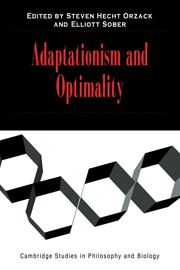Book contents
- Frontmatter
- Contents
- Contributors
- Acknowledgments
- Introduction
- 1 A Likelihood Framework for the Phylogenetic Analysis of Adaptation
- 2 Adaptation, Phylogenetic Inertia, and the Method of Controlled Comparisons
- 3 Optimality and Phylogeny: A Critique of Current Thought
- 4 Fit of Form and Function, Diversity of Life, and Procession of Life as an Evolutionary Game
- 5 Optimality and Evolutionary Stability under Short-Term and Long-Term Selection
- 6 Selective Regime and Fig Wasp Sex Ratios: Toward Sorting Rigor from Pseudo-Rigor in Tests of Adaptation
- 7 Is Optimality Over the Hill? The Fitness Landscapes of Idealized Organisms
- 8 Adaptation, Optimality, and the Meaning of Phenotypic Variation in Natural Populations
- 9 Adaptationism, Optimality Models, and Tests of Adaptive Scenarios
- 10 Adaptation and Development: On the Lack of Common Ground
- 11 Three Kinds of Adaptationism
- 12 Adaptation, Adaptationism, and Optimality
- Index
2 - Adaptation, Phylogenetic Inertia, and the Method of Controlled Comparisons
Published online by Cambridge University Press: 06 January 2010
- Frontmatter
- Contents
- Contributors
- Acknowledgments
- Introduction
- 1 A Likelihood Framework for the Phylogenetic Analysis of Adaptation
- 2 Adaptation, Phylogenetic Inertia, and the Method of Controlled Comparisons
- 3 Optimality and Phylogeny: A Critique of Current Thought
- 4 Fit of Form and Function, Diversity of Life, and Procession of Life as an Evolutionary Game
- 5 Optimality and Evolutionary Stability under Short-Term and Long-Term Selection
- 6 Selective Regime and Fig Wasp Sex Ratios: Toward Sorting Rigor from Pseudo-Rigor in Tests of Adaptation
- 7 Is Optimality Over the Hill? The Fitness Landscapes of Idealized Organisms
- 8 Adaptation, Optimality, and the Meaning of Phenotypic Variation in Natural Populations
- 9 Adaptationism, Optimality Models, and Tests of Adaptive Scenarios
- 10 Adaptation and Development: On the Lack of Common Ground
- 11 Three Kinds of Adaptationism
- 12 Adaptation, Adaptationism, and Optimality
- Index
Summary
In the Philosophical Investigations, Wittgenstein (1968, 94) describes a man who is unconvinced by a claim he reads in a newspaper, so he buys another copy of the same newspaper to double-check. The point of the joke is that it isn't just the quantity of evidence in support of a claim that matters, but the quantity of independent evidence (Sober 1989).
The issue of independent evidence is of central importance to hypothesis testing in evolutionary biology. Suppose you wanted to test the hypothesis that long fur is an adaptation to cold climate and short fur is an adaptation to warm climate. You look at 20 bear species; 10 live in a cold climate and have long fur, and 10 live in a warm climate and have short fur. Is there any reason to think that the data do not confirm the adaptive hypothesis? One worry is that the species in each group resemble each other merely because they inherited their fur length from a common ancestor of the group (and that the temperatures experienced by ancestors and descendants are similar). This influence of ancestor on descendant is often called phylogenetic inertia (e.g., see Harvey and Pagel 1991).
If phylogenetic inertia and natural selection are alternative explanations of the data, how are these competing hypotheses to be evaluated? The following quotation exemplifies a common idea about this problem:
Why do most land vertebrates have four legs? The seemingly obvious answer is that this arrangement is the optimal design. This response would ignore, however, the fact that the fish that were ancestral to terrestrial animals also have four limbs, or fins. […]
- Type
- Chapter
- Information
- Adaptationism and Optimality , pp. 45 - 63Publisher: Cambridge University PressPrint publication year: 2001
- 23
- Cited by

